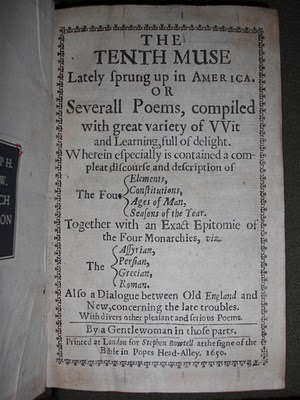T.S. Eliot’s poem, The Waste Land, may describe April as the cruelest month, but that’s only because National Poetry Month hadn’t been established yet. National Poetry Month was inaugurated in 1996 to “highlight the extraordinary legacy and ongoing achievement of American poets” and to”introduce more Americans to the pleasures of reading poetry,” among other laudable goals. So in honor of the last fleeting days of April, I thought I’d put in a tribute to the first published American poet: Anne Bradstreet.
Anne Bradstreet immigrated to America in 1630 with her husband and parents on the ship Arbella and she was one of the original settlers of the Massachusetts Bay Colony. She bore eight children, beginning in 1633 (five years after her marriage to Simon Bradstreet) and wrote her poetry while juggling her domestic duties of raising a family in a new and unforgiving environment. She circulated her poems among her friends and neighbors and it was her brother-in-law who took them to England and had them published as The Tenth Muse Lately Sprung Up in America. This was the first published book of poetry by an American and also the first book published by an American woman. The title, The Tenth Muse, which adds Anne herself to the classical nine muses, was not her choice but that of the publisher. Anne died in 1672 and the first American edition of her poems, greatly expanded from Tenth Muse, was published in Boston six years later as Several Poems Compiled with Great Wit and Learning. (We have a copy of that one as well)
In terms of poetry, The Tenth Muse can be slow going. Anne was strongly influenced by the French poet Guillaume du Bartas and the poetry published in 1650 is fairly conventional and dry, by modern standards. But she improved over time and her later poems involve much more emotion and, most scholars agree, are much more interesting. I have to confess that my appreciation of Anne Bradstreet was initially retarded by a not-very-good musical setting of one of her poems that I had to sing in high school. But I’ve moved past that. Her most famous works are the love poems she wrote to her husband. She wrote him poems not only while he was away, but also when he was at home; these pieces were only published posthumously.”To my dear and loving husband” is probably the best known:
If ever two were one, then surely we.
If ever man were loved by wife, then thee;
If ever wife was happy in a man,
Compare with me, ye women, if you can.
I prize thy love more than whole mines of gold
Or all the riches that the East doth hold.
My love is such that rivers cannot quench,
Nor ought but love from thee, give recompense.
Thy love is such I can no way repay,
The heavens reward thee manifold, I pray.
Then while we live, in love let’s so persevere
That when we live no more, we may live ever.
I’m out of time for this post right now, but you can find out more about this poem, and about Anne more generally, here and here. Enjoy!

